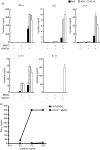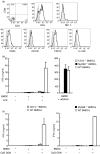Rapid and reliable generation of invariant natural killer T-cell lines in vitro
- PMID: 20067532
- PMCID: PMC2770680
- DOI: 10.1111/j.1365-2567.2009.03130.x
Rapid and reliable generation of invariant natural killer T-cell lines in vitro
Abstract
Several tools have proved useful in the study of invariant natural killer T (iNKT) cells, including CD1d-deficient mice, J alpha281-deficient mice, synthetic lipid antigens and antigen-loaded CD1d tetramers. However, the generation and examination of long-term primary murine iNKT cell lines in vitro has been challenging. Here, we show the rapid generation of iNKT cell lines from splenic iNKT cells of V alpha14 T-cell receptor (TCR) transgenic (Tg) mice. These purified iNKT cells were stimulated by bone marrow-derived dendritic cells (BMDCs) loaded with alpha-galactosylceramide (alphaGalCer) and cultured with interleukin (IL)-2 and IL-7. iNKT cells proliferated dramatically, and the cell number exhibited a 100-fold increase within 2 weeks and a 10(5)-fold increase in 8 weeks after repeated stimulation with alphaGalCer. The iNKT cell lines consisted of iNKT cells expressing V beta chains including V beta8.1/8.2, V beta14, V beta10, V beta6 and V beta7, and responded to stimulation with alphaGalCer presented both by BMDCs and by plate-bound CD1d. In addition, the iNKT cell lines produced interferon (IFN)-gamma when activated by lipopolysaccharide (LPS) or CpG oligodeoxynucleotide (ODN)-stimulated BMDCs. Further, we show that iNKT cell lines produced cytokines in response to microbial antigens. In summary, high-yield iNKT cell lines were generated very rapidly and robustly expanded, and these iNKT cells responded to both TCR and cytokine stimulation in vitro. Given the desire to study primary iNKT cells for many purposes, these iNKT cell lines should provide an important tool for the study of iNKT cell subsets, antigen and TCR specificity, activation, inactivation and effector functions.
Figures





References
-
- Brigl M, Brenner MB. CD1: antigen presentation and T cell function. Annu Rev Immunol. 2004;22:817–90. - PubMed
-
- Kronenberg M. Toward an understanding of NKT cell biology. Annu Rev Immunol. 2005;23:877–900. - PubMed
-
- Bendelac A, Savage PB, Teyton L. The biology of NKT cells. Annu Rev Immunol. 2007;25:297–336. - PubMed
-
- Mattner J, Debord KL, Ismail N, et al. Exogenous and endogenous glycolipid antigens activate NKT cells during microbial infections. Nature. 2005;434:525–9. - PubMed
Publication types
MeSH terms
Substances
Grants and funding
LinkOut - more resources
Full Text Sources
Other Literature Sources
Molecular Biology Databases
Miscellaneous

